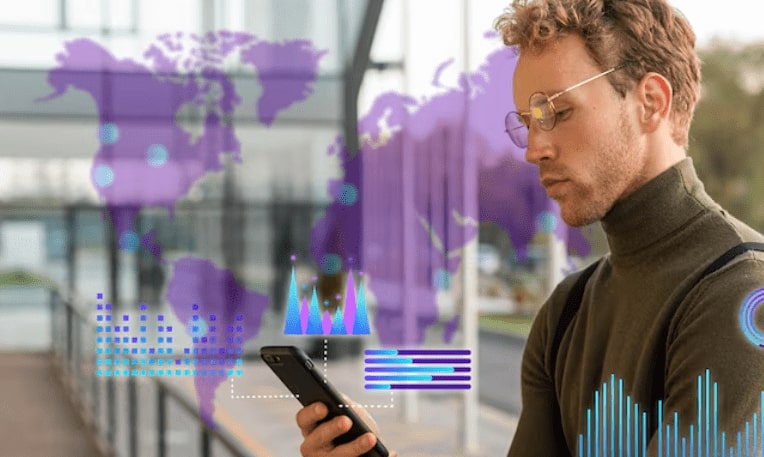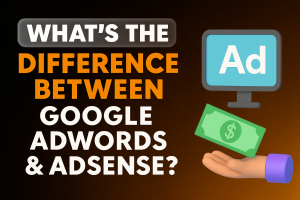In recent years, businesses have been flooded with vast amounts of customer data, yet many still struggle to translate this information into actionable insights. According to a 2025 Gartner report, over 70% of marketing leaders state that AI-driven analytics has significantly improved their decision-making process compared to traditional methods. If you are looking to understand How to Use AI in marketing analytics, this article will guide you through the essentials; explaining concepts, benefits, comparisons, and practical steps for implementation. Stay with us and explore the full details on the HDM Digital Marketing Agency blog.

By adopting the right platform, businesses in the UAE can scale personalization, enhance targeting, and gain AI-powered marketing insights that fuel long-term success.
What is AI in marketing analytics?
To truly leverage marketing data, companies need more than spreadsheets and generic dashboards. This is where AI in marketing analytics comes in. It refers to the use of artificial intelligence techniques; such as machine learning, predictive modeling, and natural language processing; to uncover patterns, trends, and customer insights at a scale impossible for humans alone. Compared to traditional analytics tools, AI not only processes large datasets faster but also delivers AI-powered marketing insights that guide more accurate business decisions. By adopting these techniques, marketers can enhance their AI business intelligence marketing approach and move beyond guesswork into measurable growth. Crucial Point: Learn more about our Digital Marketing Service, to see how advanced analytics can transform your strategy.AI vs traditional marketing analytics
When comparing AI vs traditional marketing analytics, the differences become clear in terms of speed, accuracy, and personalization. Traditional analytics focuses on historical reporting, while AI emphasizes predictive and prescriptive insights. In below table, we compare AI vs traditional marketing analytics:| Feature | Traditional Marketing Analytics | AI in marketing analytics |
| Data Processing Speed | Manual and slower | Automated and real-time |
| Accuracy of Predictions | Limited to past data | Advanced predictive models (AI predictive analytics marketing) |
| Personalization in Campaigns | Generic segmentation | Hyper-personalized targeting (AI for data-driven marketing) |
| Scalability | Restricted by resources | Scales with big data |
| Insights | Descriptive (what happened) | Prescriptive (what to do next) |
Benefits of Using AI in marketing analytics
Businesses adopting AI are not just keeping up with technology; they are gaining a competitive edge. The key benefits of AI in marketing analytics include improving the accuracy of customer behavior predictions, automating the processing of big data, and enabling hyper-personalized campaigns. In regions like the UAE, where customer expectations are rapidly evolving, these benefits are especially vital. Imagine a Dubai-based café using AI for data-driven marketing: by analyzing purchasing trends, AI tools can suggest personalized menu promotions to regular customers during peak hours, increasing loyalty and sales. Crucial Point: Check how our SEO Service, help businesses combine AI tools with visibility strategies for long-term success.How AI helps in marketing?
Understanding how AI helps in marketing requires looking at the practical applications businesses can adopt today. AI supports marketing teams by removing guesswork, automating repetitive tasks, and offering clear, actionable insights. Steps to Apply AI in Marketing:- Data Collection & Cleaning: Gather data from social media, CRM systems, and customer surveys. Example: A retail brand in Abu Dhabi collects customer purchase history to predict future buying patterns.
- Model Selection: Choose machine learning models for predictions. Example: A Dubai fitness center uses AI models to forecast seasonal membership spikes.
- Predictive Analytics: Use AI predictive analytics marketing to anticipate customer needs. Example: Restaurants in Sharjah predict popular dishes for upcoming weekends.
- Campaign Personalization: Apply AI for marketing strategy to send personalized offers. Example: A coffee shop in Dubai Mall sends app-based loyalty coupons to frequent visitors.
- Performance Tracking: Continuously refine campaigns based on AI-powered marketing insights.

Key Use Cases of AI in marketing analytics
Marketers are shifting from relying solely on intuition to embracing AI for data-driven marketing, which opens up a wide range of powerful use cases. By using AI-powered marketing insights, businesses can better understand their audiences, predict behaviors, and optimize campaigns for higher ROI. For brands in competitive markets like Dubai and Abu Dhabi, these use cases are no longer optional; they are a necessity for survival. To maximize these opportunities, use Google Ads Service and discover how AI can supercharge your ad campaigns.Customer Segmentation & Targeting
Effective segmentation is at the heart of any marketing strategy. AI in marketing analytics makes it possible to identify micro-segments that traditional methods overlook. By analyzing purchasing behavior, browsing history, and engagement data, AI ensures precise targeting. Example: A luxury fashion retailer in Dubai can use AI business intelligence marketing to segment customers by lifestyle, offering exclusive collections only to high-value shoppers.Predictive Analytics for Customer Behavior
Predicting what customers will do next is one of the most valuable contributions of AI predictive analytics marketing. Instead of reacting after the fact, businesses can act proactively. Steps to Apply Predictive Analytics:- Collect and clean behavioral and transaction data.
- Feed the data into machine learning models.
- Generate forecasts about purchase intentions or churn.
- Create campaigns tailored to predicted outcomes.
Campaign Performance Optimization
Launching a campaign is only half the job; optimizing it is where the real growth happens. AI for marketing strategy enables continuous performance monitoring and adjustment in real time. With AI-driven dashboards, marketers can test ad creatives, adjust bids, and even reallocate budgets across channels instantly. Example: A Dubai tourism agency uses AI tools to analyze which ads attract more visitors from Europe and reallocates spend accordingly for better ROI.Tools and Technologies for AI-Powered Marketing Analytics
The rapid adoption of AI analytics explained has resulted in a variety of platforms that help businesses harness AI effectively. From integrated CRM solutions to specialized analytics software, the right tool can mean the difference between fragmented data and actionable insights. For seamless dashboards and user-friendly reporting, check out our Web Design Services, where UX design meets powerful AI-driven analytics visualization. Comparing Popular AI Tools:| Tool | Features | Use Case | Strengths |
| Google Analytics 4 + AI tools | Advanced event tracking, audience modeling | Understanding user journeys | Strong integration with Google Ads, supports AI for data-driven marketing |
| HubSpot AI | Predictive lead scoring, email personalization | Inbound marketing & CRM | Ideal for SMEs, integrates how AI helps in marketing campaigns |
| IBM Watson Marketing | AI-powered customer journey orchestration | Enterprise-level marketing automation | Excellent for large datasets and AI business intelligence marketing |
Step-by-Step Guide to Implement AI in marketing analytics
Knowing what is AI marketing analytics is one thing, but applying it to real business scenarios requires a structured approach. From gathering the right data to continuous testing, the journey of implementation ensures that companies stay competitive in a fast-moving digital landscape. For a deeper dive into advertising strategies that complement AI adoption, explore our PPC Advertising Guide and read it right now. Here’s Steps to Implement AI:- Data Collection & Validation: Gather accurate data from CRM, social platforms, and transaction history. Example: A Dubai-based e-commerce brand ensures clean purchase data before training AI models.
- Choosing the Right AI Tools: Select platforms such as GA4 or HubSpot AI that fit your scale. Example: A small café in Sharjah chooses HubSpot AI for personalized customer loyalty emails.
- Integration with Existing Systems: Sync AI tools with CRM, ad platforms, and website analytics.
- Testing & Optimization: Use AI for marketing strategy to A/B test campaigns and refine continuously. Example: An Abu Dhabi real estate agency optimizes its Google Ads through real-time AI recommendations.
- Scaling Across Channels: Apply insights across search, social, email, and offline touchpoints.
Challenges and Best Practices
While the benefits of AI in marketing analytics are impressive, businesses often face challenges during implementation. The most common issues include high costs, the need for high-quality data, and the complexity of AI-powered tools. Without the right foundation, even the most advanced solutions may fail to deliver accurate AI-powered marketing insights. To overcome these challenges, adopting a solid Content Marketing Strategy, can help ensure better data quality and alignment across marketing campaigns. Best Practices for Success:- Invest in Data Quality: Ensure that your CRM, customer surveys, and transaction records are accurate and consistent.
- Start Small and Scale: Begin with one AI project, such as predictive analytics for email campaigns, before scaling.
- Train Your Team: Upskill marketers to work with AI business intelligence marketing tools effectively.
- Monitor and Adjust Continuously: Use A/B testing to refine models and campaign strategies.
- Balance Automation with Human Insight: AI should guide decisions, not replace strategic thinking.
Future of AI in marketing analytics
The future of AI for data-driven marketing is set to reshape how companies approach decision-making and customer engagement. As AI technology evolves, predictive and prescriptive models will become even more accurate, enabling businesses to design campaigns that anticipate customer needs before they arise. For a deeper understanding of upcoming trends, explore our insights on Digital Marketing Trends 2025 and never forget one thing. And it’s that emerging technologies such as generative AI, automated customer journey mapping, and real-time personalization will enhance AI for marketing strategy. In markets like the UAE, where customer demands shift rapidly, companies that adopt these technologies will stay ahead of the competition. The role of AI analytics explained will no longer be just about reporting; it will shape core strategic decisions.Conclusion: Why Should Businesses Adopt AI in Marketing Analytics?
The rise of AI predictive analytics marketing and AI vs traditional marketing analytics clearly shows that businesses can no longer rely on outdated methods. With benefits such as higher accuracy, campaign personalization, and AI-powered marketing insights, adopting AI is not just an option; it is essential for growth. By embracing these tools and using Ads Services, companies gain a stronger, data-driven foundation to compete in digital economy. If you are ready to explore How to Use AI in marketing analytics for your business, now is the time. For successful and advanced Ads Services, Contact Us at HDM’s UAE branch. Call us directly at +971 56 26 01 368 or fill out our consultation request form to connect with our digital marketing team. Let us help you design strategies that combine AI innovation with proven results.Frequently Asked Questions (FAQs)
- What is AI marketing analytics and how is it different from AI business intelligence marketing? AI marketing analytics focuses on campaign performance, customer segmentation, and predictive modeling. In contrast, AI business intelligence marketing is broader, covering company-wide data analysis to support executive decision-making.
- How AI helps in marketing for small businesses with limited budgets? Small businesses can adopt cost-effective tools like HubSpot AI or GA4. These platforms provide affordable AI-powered marketing insights that scale with growth without requiring heavy upfront investment.
- Can AI analytics be explained to improve customer experience in real time? Yes. Real-time AI for data-driven marketing can adjust ad placements, personalize email campaigns, and even tailor website content to individual users on the spot.
- What industries benefit the most from AI predictive analytics marketing? Retail, real estate, hospitality, telecom, and healthcare all benefit greatly. For instance, restaurants in Dubai use AI to predict peak dining hours, while real estate agencies in Abu Dhabi forecast property demand.
- Is AI vs traditional marketing analytics only about speed? Not at all. While speed is important, the main difference is in accuracy, personalization, and prescriptive insights. Traditional methods explain what happened, while AI recommends what actions to take next.




